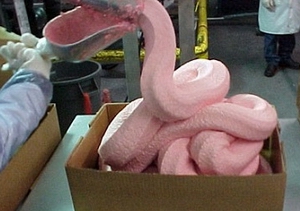 idelberg outbreak at a Tennessee prison that sent two of the nine infected inmates to the hospital is a subject of a new report pointing to a larger investigation from the U.S. Centers for Disease Control and Prevention.
idelberg outbreak at a Tennessee prison that sent two of the nine infected inmates to the hospital is a subject of a new report pointing to a larger investigation from the U.S. Centers for Disease Control and Prevention.CDC says the outbreak associated with 33,840 pounds of mechanically separated chicken recalled on Jan. 10 by Tyson Foods is being investigated by the agency’s National Antimicrobial Resistance Monitoring System (NARMS) laboratory.
The NARMS lab is currently conducting antibiotic resistance testing on clinical isolates collected from the sickened prisoners infected with the outbreak strain of Salmonella Heidelberg. NARMS is a public health surveillance system that tracks antimicrobial resistance in foodborne and other enteric bacteria found in people, raw meat and poultry and food-producing animals.
Results of NARMS testing in the Salmonella Heidelberg outbreak will be reported when completed, according to CDC.
State and federal investigators have concluded that the Tyson brand mechanically separated chicken is the likely source of the Salmonella Heidelberg outbreak. The strain is one commonly reported to PulseNet, and 19 other people in 12 states were reported to have it late last year, with onset dates between Oct. 22 and Dec. 15, 2013.
Four to eight cases of this strain are reported to PulseNet each month.
CDC says that more investigation is required to determine if those cases are related to the ones in Tennessee. However, agency officials did say these cases are not related to the mutlti-drug resistant Salmonella Heidelberg infections linked to Foster Farms brand chicken.
Raw poultry products often are contaminated with Salmonella bacteria.







